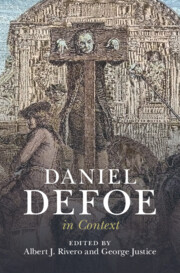Book contents
- Daniel Defoe in Context
- Daniel Defoe in Context
- Copyright page
- Contents
- Illustrations
- Notes on Contributors
- Preface
- Acknowledgements
- Chronology
- Part I Life and Works
- Part II Literary Context
- Part III Authorship and Copyright
- Chapter 15 Defoe and Censorship
- Chapter 16 Professional Authorship
- Chapter 17 Digital Defoe
- Chapter 18 Anonymous Defoe
- Part IV The Monarchy and Parliament
- Part V Social Structures and Social Life
- Part VI Critical Fortunes and Literary Afterlife
- Further Reading
- Index
Chapter 18 - Anonymous Defoe
from Part III - Authorship and Copyright
Published online by Cambridge University Press: 27 April 2023
- Daniel Defoe in Context
- Daniel Defoe in Context
- Copyright page
- Contents
- Illustrations
- Notes on Contributors
- Preface
- Acknowledgements
- Chronology
- Part I Life and Works
- Part II Literary Context
- Part III Authorship and Copyright
- Chapter 15 Defoe and Censorship
- Chapter 16 Professional Authorship
- Chapter 17 Digital Defoe
- Chapter 18 Anonymous Defoe
- Part IV The Monarchy and Parliament
- Part V Social Structures and Social Life
- Part VI Critical Fortunes and Literary Afterlife
- Further Reading
- Index
Summary
This essay explores the strange, winding, and sometimes hotly debated formation of the Defoe canon in the eighteenth and nineteenth centuries. It pays particular attention to the state of Defoe attributions in the twenty-first century. What emerges from tracing the history of Defoe’s anonymous productions, their circulation, and processes of attribution is an ongoing transformation in our sense of Defoe as an author. Whether we know Defoe primarily as a proto-novelist or as a political pamphleteer is much more a product of the processes by which anonymous works have been attributed to him than a reflection of what he may actually have written.
Keywords
Information
- Type
- Chapter
- Information
- Daniel Defoe in Context , pp. 145 - 152Publisher: Cambridge University PressPrint publication year: 2023
